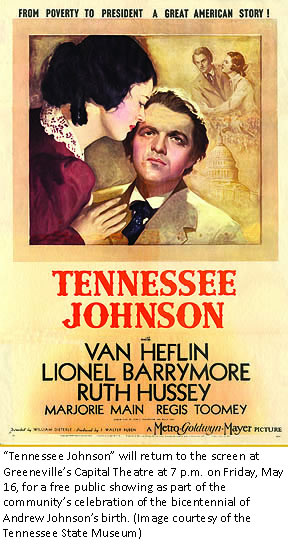 In April 1943, Japan’s top military commander was killed in an attack by American forces, Jews in Warsaw begin an unsuccessful uprising against their German captors, and the film, “Tennessee Johnson,” made its Greeneville premier.
In April 1943, Japan’s top military commander was killed in an attack by American forces, Jews in Warsaw begin an unsuccessful uprising against their German captors, and the film, “Tennessee Johnson,” made its Greeneville premier.
Sixty-five years after the film of Andrew Johnson’s life was first shown in his hometown, the Museums of Tusculum College are bringing the movie back to the screen of the Capitol Theatre as part of the community’s celebration of the bicentennial of the 17th president’s birth. The screening will be 7 p.m. on Friday, May 16, at the historic Capitol Theatre.
Admission to the movie is free. In 1943, when it was originally screened, admission was 11 cents for the matinee and 30 cents for the evening show.
The MGM production, which was interestingly called “Andrew Johnson, The Man on America’s Conscience” in England, has been provided for the screening through the generosity of Turner Classic Movies. Support for this program has been provided in-part by the Andrew Johnson Bicentennial Committee, which is coordinating the Greeneville community’s celebration of the 200th anniversary of its most famous son’s birth through a variety of events.
The film, directed by William Dieterle, starred Van Heflin as Johnson, Lionel Barrymore as his nemesis, Thaddeus Stevens, and Ruth Hussey as Eliza McCardle Johnson. The screenplay was written by Milton Ginzburg, Alvin Meyes, John Balderston, and Wells Root.
World War II movie news clips will be shown with the film to give viewers the flavor of the times in which “Tennessee Johnson” originally premiered in Greeneville. Also illustrating the nationalistic flavor of 1943 will be a display, created by Tusculum College Museum Studies students, which will be in the lobby of the Capitol for the screening. The display features the movie poster and stills, information about the film, and war effort-related advertising from the era in which the film was produced and shown.
Historian Dr. Robert Orr, an expert on Johnson’s life, will provide commentary prior to the showing of the move, noting the historical inaccuracies found in the film. Those familiar with Johnson’s life will quickly spot these inaccuracies, possibly the result of “Hollywoodization” of some of the events to make them more dramatic for the big screen.
“Tennessee Johnson” depicts the events building up to the impeachment of Johnson. The film traces Johnson’s humble arrival in Greeneville as a runaway tailor’s apprentice and his first foray into politics on the local level.
The film then follows Johnson’s experience on the national level as a U.S. Senator, who refuses to join his Southern colleagues in their exodus from the Senate chambers once the secession began, as Lincoln’s vice president, and as president.
After Lincoln’s assassination, Johnson begins to bump heads with the Radical Republicans who want to punish the South, which differs from Johnson’s policy of reconciliation with the South. The film climaxes with the events surrounding Johnson’s impeachment and subsequent trial.
Volunteers from the Nathanael Greene Museum will be providing support during the screening and offer refreshments during the evening intermission. Commemoration of the Andrew Johnson Bicentennial is a focal point this year for the Museums of Tusculum College. The museums have developed a new educational program for school groups that focuses on the Constitution and Johnson’s life and a special exhibit featuring artifacts from the life of Johnson is on display at the President Andrew Johnson Museum and Library. On September 17, the Museums are organizing a special commemoration of the Bicentennial and National Constitution Day with a performance by the 113rd U.S. Army Band from Fort Knox. On September 18, the Museums will host a Symposium exploring Johnson’s life, his impact on his era, the presidency and the Constitution and featuring experts Dr. Paul Bergeron of the University of Tennessee, Dr. Michael Kent Curtis of Wake Forest University School of Law, Dr. Eric Foner of Columbia University and Dr. Orr.
The Doak House Museum and the President Andrew Johnson Museum and Library are administered by the Tusculum College Department of Museum Program and Studies under the direction of George Collins, director of Museum Program and Studies, and Cindy Lucas, associate director of the department and director of the Doak House Museum. The department also offers one of the few undergraduate degree programs in museum studies in the country.
The Doak House Museum, which was the home of the Rev. Samuel Witherspoon Doak, co-founder of the college, hosted nearly 10,000 school children from East Tennessee last year for a variety of educational programs related to the 19th century and CHARACTER COUNTS! The Andrew Johnson Museum, located in the oldest academic building on campus, houses a collection of books, papers, and memorabilia of the 17th president of the United States. The museum also houses the Charles Coffin Collection from the original college library and the College archives containing documents related to the history of Tusculum. The museums are also two of the 10 structures on the Tusculum campus on the National Register of Historic Places.


